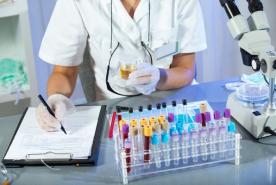August 10, 2023
Leer los resultados de su panel metabólico completo (PMC) no tiene por qué ser intimidante. Utilice la siguiente información como guía pero recuerde que cada persona es diferente, por eso hable siempre con su proveedor de atención médica sobre sus resultados. No tema hacer preguntas, busque una segunda opinión o pida que le realicen más pruebas—los proveedores están a su servicio.
¿Qué es un PMC?
Un PMC es un análisis de sangre simple y seguro. El análisis aporta importante información sobre el equilibrio químico y el metabolismo de su organismo, que es la forma en la que su cuerpo utiliza los alimentos y la energía. Algunas de las pruebas incluidas en el PMC brindan información sobre:
- Los riñones
- Los electrolitos
- El calcio
- Las proteínas
- El hígado
- El azúcar en sangre
Hacerse un PMC puede ser parte de un chequeo de rutina o su profesional de atención médica puede indicarlo si sospecha enfermedad renal o hepática. Dado que la enfermedad renal tiene pocos síntomas en sus etapas iniciales, hacer pruebas frecuentes es la mejor forma de detectarla. Por eso, solicitar esta prueba es una excelente manera de tener una mejor visión de su función renal y salud general.
"A menos que te hagas un chequeo anual", dice George Franklin III, receptor de un trasplante de riñón de 46 años, "te hagas análisis de sangre y esas cosas, no sabes qué está pasando dentro de tu cuerpo. Mi riñón dejó de funcionar porque tenía glomerulonefritis… que es algo que generalmente pasa desapercibido a menos que te hagas un chequeo o algunos análisis de sangre".
Responda en un minuto este cuestionario para ayudar a determinar si corre el riesgo de desarrollar enfermedad renal y lleve los resultados a su proveedor de atención médica para poder iniciar una conversación.
¿Buscas más información?
Únete a nuestra comunidad
Mantente conectado y accede a recursos adicionales relacionados con la enfermedad renal.
¿Cómo leo mis resultados?
Prueba | Objetivo | Rangos normales1 |
| Albúmina | La albúmina es una proteína importante que se encuentra en la sangre. | 3.4 a 5.4 g/dl (34 a 54 g/l) |
| FAL (fosfatasa alcalina)2 | Esta es una enzima importante que se encuentra en el hígado, los riñones y los huesos. | 20 a 130 u/l |
| ALT (alanina aminotransferasa)3 | La ALT es una enzima importante que se encuentra principalmente en el hígado. | 4 a 36 u/l |
| AST (aspartato aminotransferasa)4 | La AST es una enzima importante que se encuentra en el hígado, el corazón y los músculos. | 8 a 33 u/l |
| NUS (nitrógeno ureico en sangre) | El nitrógeno ureico es un producto de desecho normal que surge de la descomposición de la proteína. Los riñones lo eliminan de la sangre, pero cuando la función renal disminuye, los niveles de NUS aumentan. | 6 a 20 mg/dl (2.14 a 7.14 mmol/l) |
| Calcio sérico | Este es un mineral que se almacena principalmente en los huesos. | 8.5 a 10.2 mg/dl (2.13 a 2.55 mmol/l) |
| Cloruro5 | Es un electrolito que se utiliza para ayudar a controlar los líquidos en el cuerpo. | 96 a 106 mEq/l (96 a 106 mmol/l) |
| CO2 (dióxido de carbono)6 | Es un electrolito que se utiliza para ayudar a controlar los líquidos en el cuerpo. | 23 a 29 mEq/l (23 a 29 mmol/l) |
| Creatinina | La creatinina es un producto de desecho del desgaste muscular que todos tenemos en la sangre. Su exceso puede indicar problemas renales. Los médicos utilizan estos resultados para determinar el IFGe. | 0.6 a 1.3 mg/dl (53 a 114.9 µmol/l) |
| Glucosa (azúcar) | El azúcar es una importante fuente de energía para el cuerpo, pero en niveles altos o no controlados puede causar daño. Esta prueba busca detectar diabetes, la principal causa de insuficiencia renal. | 70 a 100 mg/dl (3.9 a 5.6 mmol/l) |
| Potasio | El potasio es un mineral que se encuentra en muchos alimentos y ayuda a mantener la regularidad de los latidos del corazón y el buen funcionamiento de los músculos. | 3.7 a 5.2 mEq/l (3.70 a 5.20 mmol/l) |
| Sodio | El sodio es un mineral que se encuentra en la mayoría de los alimentos y es el ingrediente principal de la sal de mesa. Si los riñones no están sanos, se puede acumular sodio y líquidos en el cuerpo. | 135 a 145 mEq/l (135 a 145 mmol/l) |
| Bilirrubina total7 | Se encuentra en un líquido que produce el hígado. | 0.1 a 1.2 mg/dl (2 a 21 µmol/l) |
| Proteína total | La proteína ayuda a formar músculo, curar heridas, combatir infecciones y preservar la salud. | 6.0 a 8.3 g/dl (60 a 83 g/l) |
¿Necesita ayuda para descifrar sus valores de laboratorio?
Llámenos sin cargo al 855.NKF.CARES (855.653.2273) o escríbanos a nkfcares@kidney.org para hablar con un especialista capacitado que responderá sus preguntas y escuchará sus inquietudes. La línea está diseñada para pacientes, familiares y cuidadores afectados por la enfermedad renal, la donación de órganos o el trasplante.






